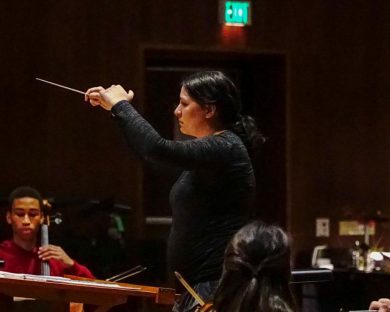“I knew I wanted to become a composer from a very young age,” says Stéphanie Hamelin Tomala with conviction. “I composed my first piece when I was 10, and my teacher helped me transcribe the sheet music. Then, when I was 13, I saw Lord of the Rings. Howard Shore’s music! That’s when I knew I wanted to become a screen composer.” She achieved her goal a few years later: nominated in the Emerging Artist category at the recent Gémeaux gala, Stéphanie’s career took off.
 She’s animated by a passion for both music and movies. “I’m very attracted to sci-fi,” says Tomala, who distinguished herself with the original score for the short film Area 51 (Lee Gallagher, 2018) that earned her a first prize from the SOCAN Foundation in the Best Original Score – Animation.
She’s animated by a passion for both music and movies. “I’m very attracted to sci-fi,” says Tomala, who distinguished herself with the original score for the short film Area 51 (Lee Gallagher, 2018) that earned her a first prize from the SOCAN Foundation in the Best Original Score – Animation.
“I really enjoyed that project, because it’s a mix of sci-fi and animation, which is one of the hardest media for which to compose. That’s because animation often has a lot of very rapid changes in the emotional spectrum, and you need to compose music that follows those changes. It’s demanding, it’s a challenge, but that’s what I enjoy the most.”
Tomala even says she planned her entire education according to her goal of becoming a screen composer. A violinist by training, she turned to the piano while she was in high school, “because a teacher told me that I needed to learn to play the piano if I dreamt of becoming a composer. Whenever a teacher gave me advice, I’d listen!” says the musician, before adding that the piano is like “a small orchestra that I can use to imagine the arrangements of a piece for an actual orchestra.”
After graduating with a Master’s degree in Composition from the Université de Montréal, she then obtained a graduate degree in Film Music at Université de Québec à Montréal (UQAM), and continued her training in Lyon, France. “There aren’t that many programs to learn screen composition in Montréal, at least [there weren’t] back then. I had to go out and get all the training I could,” before getting into the business. Since then, she’s penned music for some 60 short films, as well as feature films and television productions. “I really enjoy inter-disciplinary work, as long as there is a story behind the project that can inspire me,” she says.
Tomala is adamant that she’s the most comfortable when dealing with the constraints inherent to a director’s vision. “The directors I work with guide my work, sometimes with precise musical references, sometimes not at all, which leaves me free rein,” she says. “I prefer working from reference music, but not already placed on the images of a scene, because it often means that the director wants something very similar to the reference piece. I still prefer that they send me one or two pieces of music in the style that they’re looking for. From there, I’ll ask myself, ‘Why this sound or that style? What do they like?’ And based on that, I look for inspiration for my own vision… or their vision!’
She cites the influence of John Williams, “one of the first models you turn to in the business”; Italian composer Dario Marianelli, a loyal collaborator of director Joe Wright (his score for the film Atonement won him an Oscar); and the late Icelandic composer Jóhann Jóhannsson, who scored three of Denis Villeneuve’s films (Sicario, Arrival, and Blade Runner 2049). “His way of mixing textural music and melodies brought about a different way of writing music,” says Tomala.
Women are still under-represented in the field, but she insists on highlighting the contributions of the great Rachel Portman (‘”he uses strings a lot in her music, which I really like – I’m also a violinist, there’s a connection!”) and, more recently, Iceland’s Hildur Guðnadóttir, who was Jóhannsson’s assistant.
“We need more women in this business, especially in Québec,” says Tomala. “Personally, I know about 40 who are already working in this field, or who’ve expressed the desire to pursue such a career. The problem is, it’s difficult for them to stand out. And that’s something that’s dear to my heart: giving a space to women in screen composition.”